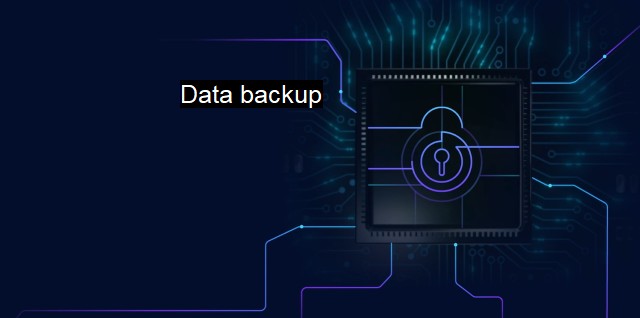What is Data backup?
The Importance of Data Backup in Cybersecurity: A Comprehensive Guide to Protecting Your Digital Assets
Data backup, a critical aspect of cybersecurity management, involves creating duplicative copies of digital information, files, databases, or entire systems. These copies are stored separately from the original data, thereby safeguarding it from unexpected losses, crashes, malicious attacks, or physical damage to the storage device. Advancement in cybersecurity mandates the necessity of data backups as losing digital data without a reliable backup can lead to severe operational, financial, or even legal consequences.In the vast field of cybersecurity, data backup plays an exceptionally preventative role. The intention is not just to prepare for sudden hardware or software failures, but to protect the data primarily from increasingly sophisticated cyber threats. These cyber threats include, but are not limited to, ransomware attacks, where malicious malware encrypts data and demands a ransom to regain access, or Distributed Denial of Service (DDoS) attacks, whose intention is to make data or network resources unavailable to intended users.
This is where data backup forms a symbiotic relationship with antivirus software. Antivirus software is a program or set of programs designed to prevent, search for, detect, and remove software viruses and other malicious software. When an antivirus detects a threat, it essentially stops and deletes it. if the malicious software has already caused damage before detection, that's where a backup comes in handy.
For instance, consider the ransomware attack scenario. If an antivirus detects a ransomware, it will isolate or remove it. antiviruses aren’t always infallible. In many instances, a ransomware might evade detection and encrypt the user’s files. In such cases, without a data backup, a user would be coerced to pay the ransom, in hopes of regaining access to encrypted files or suffer the loss of that data. having a backup would allow the user or an organization to restore their information quickly.
Further, data backups can improve the integrity of a user's digital information. When data is collected, stored, and managed all in one place, especially large data sets, it becomes a coveted target for attackers. Having a backup reduces the importance of the original database, deterring cybercriminals, while giving organizations a better chance to respond to cyber threats.
There are different kinds of data backup options. The most common ones include full backup, incremental backup, and differential backup. Full backup involves backing up all files and folders in a universe of discourse. Incremental backups record changes that have occurred since the most recent backup of any type, while differential backups record changes from the most recent full backup. Each of these backups serves different needs and depends on factors like data size, security need, data access frequency, and costs.
There are also different secure locations where backup data can be stored: physical storage devices like external hard drives, network-attached storage, CDs, or more contemporary methods such as cloud storage services. Nonetheless, the considered rule for backup is the 3-2-1 strategy: Make three copies of your data, store it on two different types of media, and keep one backup offsite. This method reduces the risk of any form of data loss — irrespective of the nature or source of the loss.
Given the increasing uncertainties of cyber threats, data backup is an indispensable part of cybersecurity strategy. Paired with powerful and updated antivirus software, it forms the bedrock of robust and resilient cybersecurity infrastructure. Regular backup doesn’t just ensure data recovery after unforeseen losses but also deters potential cyber-attacks and ensures the continuity of operations. Organizations and individuals are urged to prioritize its implementation as part of the broader cybersecurity strategy to safeguard their invaluable digital assets from potential threats.

Data backup FAQs
What is data backup?
Data backup is a process of creating copies of important data and storing it separately from the original source. This is done to ensure that in case of data loss due to cyber attacks, system crashes, or any other disaster, the data can be easily retrieved and restored.Why is data backup important for cybersecurity and antivirus?
Data backup is important for cybersecurity and antivirus because it helps to protect against data loss due to cyber attacks or malware infections. In case of an attack or infection, data can be easily restored from the backup without having to pay a ransom or lose valuable information.What are the different types of data backup?
There are several types of data backup, including full backup, incremental backup, and differential backup. Full backup involves copying all data to a backup location, whereas incremental backup only copies changed data since the last backup. Differential backup copies changed data since the last full backup.How often should I perform data backups?
Data backups should be performed regularly to ensure that important data is always up-to-date and accessible in case of a disaster. The frequency of backups will depend on the amount of data and how frequently it changes. It is recommended to perform backups at least once a week for most businesses.| | A | | | B | | | C | | | D | | | E | | | F | | | G | | | H | | | I | | | J | | | K | | | L | | | M | |
| | N | | | O | | | P | | | Q | | | R | | | S | | | T | | | U | | | V | | | W | | | X | | | Y | | | Z | |
| | 1 | | | 2 | | | 3 | | | 4 | | | 7 | | | 8 | | |||||||